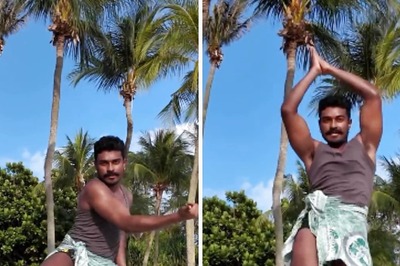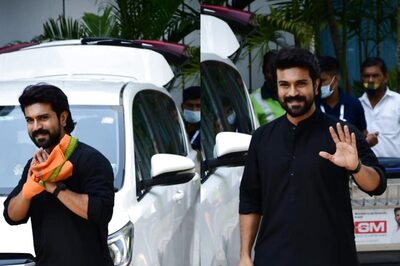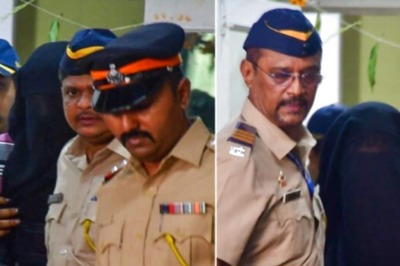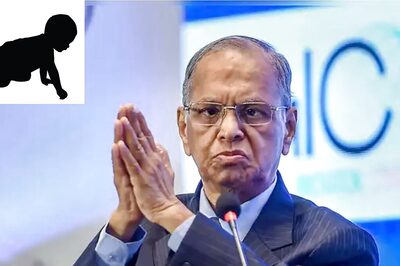
views
Born on 3 April 1914 into the Manekshaw family at Amritsar Sam Hormusji Framji Jamshedji Manekshaw, India's first Field Marshal, has 3 brothers and 2 sisters. Captain Hormusji who saw service with the Royal British Army as a "Medical Officer" in the Middle Eastern region of Messopotamia during the "First World War," had come to Amritsar from Bombay where his medical ractice did not flourish too well! At Amritsar, Dr Hormusji started a medical practice and a chemist shop/pharmacy, where his prescriptions were formulated, so that his patients could have easier access to medication especially when pre formulated patented drug formulations were few and far between!
With all their children born in Amritsar, Fali, the eldest, had his schooling in Bombay while the other boys Jan, Sam and Jemi went to school at "Sherwood College" at Nainital. The two sisters went to school at Murree now in Pakistan. All the Manekshaw children imbibed a very strong sense of honour and integrity from their father, Sam inherited his mother's sense of the ridiculous.
Although he had promised, Dr Manekshaw felt that this son, Sam, who had passed the Senior Cambridge examination with distinction from "Sherwood" in Nainital at the age of 15 years, was not yet ready to be on his own in England for further studies. He was therefore admitted to the Hindu Sabha College, Amritsar. In 1931, when the practice of training Indian Officers at "The Royal Military Academy" at Sandhurst in England came to an end and India had its' own Military Academy set up in Dehra Dun, Sam was amongst the first batch of Indians to qualify in the examination to gain admission and enrol into the "Indian Military Academy" at Dehra Dun. He joined the Academy on 30th September, 1932. Being a good tennis player, he was appointed the Captain of the "Academy Tennis Team" and was awarded the "Tennis Blue" on 12th October 1933. During his time in the Academy, Sam was frequently in trouble with the rules and laws of the Academy!
On passing out from the Academy he was commissioned into the Indian Army as a Second Lieutenant in "The Frontier Force Regiment" on 4th February 1934. The "First Course" with which Sam passed out, gave three chiefs to three Armies! They were, General Sam Manekshaw-Indian Army, General Mohammed Musa-Pakistan Army and General Smith Dun- Burmese Army. On completion of his attachment, as was customary then, with a British Infantry Battalion, the 2nd Battalion the Royal Scots, he joined the 4th Battalion, 12 Frontier Force Regiment, also known as the 54th Sikhs. After partition of India, this Regiment opted to join the Pakistan Army.
It was in 1937, that he met his future wife, Silloo Bode at a social gathering in Lahore where she was visiting her sister and brother-in-law, a Colonel in the Army Medical Corps. It was "Love at first sight" and they were married on 22nd April 1939. Silloo had her education at Bombay from where she graduated from "Elphinstone College" and later from the "JJ School of Arts" there. An insatiable reader and a talented painter, she had a multi faceted personality with a great grooming and equally great talent. A very intelligent and a well informed person, her greatest quality was her incisive mind and a very earthly approach to problems. A gracious mother and an affectionate wife, she always gave the right advice to her husband and family without hesitation. She was the anchor that kept the family's feet firmly on the ground. She always had time for her husband's staff officers, knew their wives and families and their problems. The only time she was ever seen to exercise 'rank' was when she was collecting for a charity or getting something done for someone who otherwise, would have had to wait or do without.
Silloo gave birth to her first daughter Sherry on 11 January 1940, while the second girl whom they called Maya was born on 24 September 1945. Sherry joined the "Travel Trade" beginning with Air India and working with Mercury Travels for a long time, in fact she retired from there! She married Dinky Batliwala who was working with "Swiss Air". The Batliwalas who now live in Chennai, have one daughter named Brandy who lives abroad. Maya the younger one became a stewardess with the then "British Overseas Airways Corporation" (BOAC) now called British Airways. It was while flying for them that she met her husband Dhun Daruwala who was an Engineer with "Air India." The Daruwalas have two sons Rahul Sam and Jehan Sam. Maya did her degree in Law from London University and went on to become a Barrister from "Lincolns". She is currently heading an NGO for Human Rights in Delhi.
In the Second Great War, he saw service with his unit on the Burma front as a part of the famous 17 Infantry Division. On 22nd February 1942, Sam was wounded while gallantly leading his company to capture a vital enemy position, when he took the impact of a burst fired from a Japanese machine gun in his stomach and body. He was taken to the "Regimental Aid Post" from where the regimental medical Officer, Captain GM Diwan, evacuated him to the Hospital at Pegu. Here the surgeon who examined him asked him what had happened? Sam told him, "I was kicked by a bloody mule!" Hearing this response, the surgeon laughed and said "Given your sense of humour, it will be worth saving you!" After being operated upon, he was evacuated to Rangoon, from where he sailed for India in one of the last ships to leave that port before it fell to the Japanese. For this act of gallantry he was awarded the "Military Cross."
Once discharged from the hospital and reunited with his family after a long separation, Sam was detailed to attend the "8th Staff Course", at the Staff College Quetta (In Pakistan) from 23 August 1943 to 22 December 1943 in the rank of a temporary Major. On completion of the Staff College Course, he was posted as the "Brigade Major", (BM) a critical appointment, to the "Razmak Brigade" in Waziristan close to the North Western Frontier Province, now in Pakistan. He remained in this job from 13 January to 22 October 1944 whereafter he was posted to 9/12 Frontier Force Rifles (FFR) in Burma (now known as Myanmar) who were then on the move astride the Rangoon-Mandalay highway as a part of the victorious 14th Army under General Slim. During the closing days of the war, he went as a staff officer to General Daisey to Indo China, where, after the Japanese surrender, he helped in the rehabilitation of over 10,000 Japanese prisoners of war. He was then posted to the Staff College Quetta as General Staff Officer, Grade -2 (GSO-2). Before he could take up this assignment, he was selected by Field Marshal Lord Claude Auchinlek, the Commander-in-Chief of India to go on a lecture tour to Australia for a period of six months in 1946. The main purpose of this tour was to bring home to the Australians, Indias' war effort and the achievement of its' Armed Forces since it was perceived that this was not too well known in that region!
On his return from the Australian lecture tour, he was promoted to the rank of a local Lieutenant Colonel and while continuing to be on the panel of Frontier Force Regiment, he was posted to General Headquarters at New Delhi as General Staff Officer, Grade-1 (GSO-1), Military Operations-3 (MO-3) till then the sole preserve of the British Officers. He was the first Indian posted to the MO Directorate. In December 1946 when the division of assets and regiments between Pakistan and Indian Armies crystallized a little, and it became clear that the Frontier Force Regiment would remain with Pakistan, Sam was empanelled on the panel of 16th Battalion of The Punjab Regiment, and posted as GSO-1, MO-1. Here he served from 1st January 1947 to 21 July 1947. On 15th August 1947, when India became independent, Sam was transferred to the panel of the 5th Royal Gorkha Rifles, (FF) and was posted to command the 3rd Battalion of the 5th Gorkha Rifles. However, before he could proceed to take over this Battalion, Pakistani tribals with the help of Pakistan Army had attacked parts of Kashmir and managed to reach close to Srinagar. Considering the operational situation, his posting to command the Battalion was cancelled and he continued to serve with the MO Directorate as GSO-1 (ops) at Army HQ. It was thus that the future and first Field Marshal of the Indian Army was denied a chance to command a Battalion in the Army! This has always been disappointing for him.
At the time of these operations, Sam Manekshaw, the first "Field Marshal" after independence, in the Indian Army, had a ringside view of events. Then a Lieutenant Colonel, he accompanied V P Menon on his historic mission to Kashmir, to get the then ruler of the State of Jammu & Kashmir, Maharaja Hari Singh to sign the "Instrument of Accession" and accede to the Indian Union.
Later he was granted the acting rank of a Brigadier and appointed Director, MO (OPS). Sam continued in this assignment till 10th March 1952. During this trying period, Sam had numerous opportunities to interact with Sardar Vallabh Bhai Patel who was the Home Minister in the Union Government. The Sardar was constantly in touch with Sam seeking update on the operations in Kashmir Hyderabad and so on and in the process both got to know each other well.
In 1948, Sam and Thimayya, then a Major General, were a part of the Indian Delegation to the UN, led by Sir BN Rau, as military advisors. It was here that he first met with Mrs. Indira Gandhi, who was on board the same ship along with her father, Pandit Jawahar Lal Nehru, the Prime Minister of India, sailing to Paris. The two Generals, spent nearly three months in Paris where the session was held.
In March 1952, Sam was posted to Ferozepur in command of 167 Infantry Brigade. It was his first command assignment after the war. In 1953, he was appointed Colonel of the 8th Gorkha Rifles. Having finished with the command of the brigade, Sam was posted to the Army HQ as "Officiating Director of Military Training" (DMT) from April 1954 to January 1955. In May 1955, Brigadier Sam Manekshaw was posted as Commandant to the Infantry School. He was the first Indian to be posted to that Institution.
In November 1956 Sam left for the UK to attend the course at the "Imperial Defence College" (IDC) till December 1957. On completion of this course and his return in December 1957, he was posted to command 26 Infantry Division at Jammu. He took over the Division from Major General PP Kumaramangalam, DSO., who was posted to the Staff College at Wellington as Commandant. It was here, at Jammu, that a life long friendship developed between Sam and Mr DP Dhar, who was then a minister in the State Cabinet of the State of Jammu & Kashmir. It was also here that he had a spat with the then Defence Minister, Mr VK Krishna Menon. After command of the division Sam was posted to the Staff College at Wellington to replace General Kumaramangalam, yet another time! While commanding the Staff College, he was cleared for his next rank. Before he could be promoted, Krishna Menon and General BM Kaul, a Kashmiri Officer with his lineage rooted in the Nehru clan, ordered an inquiry against Sam as the Commandant of the Staff College. Having been exonerated of all charges, Sam was appointed to command 4 Corps after General Kaul resigned in the wake of the Chinese war!
General Manekshaw was appointed GOC-in-C Western Command with its' Headquarters at Simla after the tragic death of Gen Daulat Singh in a helicopter crash in Poonch in J&K, in November 1963. He assumed command of Western Command on 4th December 1963, and moved to replace Gen Kumaramangalam in Eastern Command in 1964. On 8th June 1969, Sam took over as the Chief of Army Staff, once again from General Kumaramangalam, where apart from other contributions his finest hour was the surrender of the Pakistan Army in Dacca in 1971. In recognition of his service to the nation, he was created as the first "Field Marshal" in independent India on 1st January 1973.
He died in 2008 at the age of 94.
(COURTESY - "Leadership: Field Marshal Sam Manekshaw" - SDS PUBLISHERS, NOIDA)




















Comments
0 comment